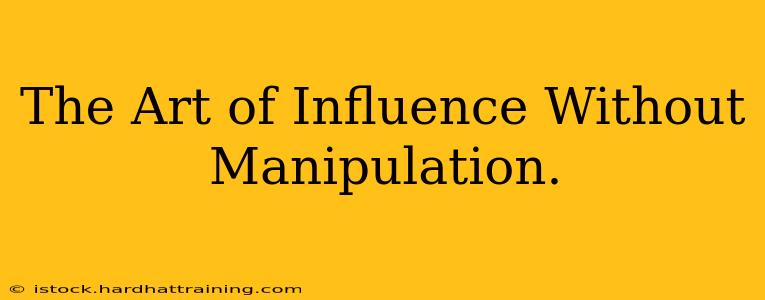Influence. It's a word that often conjures images of slick salespeople, manipulative marketing tactics, and hidden agendas. But true influence isn't about control; it's about connection, understanding, and inspiring positive change. This article explores the art of wielding influence ethically and effectively, focusing on building genuine rapport and fostering collaborative relationships rather than resorting to underhanded tactics.
What is the difference between influence and manipulation?
This is a crucial distinction. Influence is about persuasion based on shared values, mutual respect, and a genuine desire to help the other party. It focuses on building a strong foundation of trust and understanding. Manipulation, on the other hand, is about control and coercion. It uses deceptive tactics, emotional blackmail, or pressure to achieve a desired outcome, often at the expense of the other person's well-being. The key difference lies in intention and respect. Influence aims for a win-win scenario; manipulation seeks a win-lose outcome.
How can I influence people ethically?
Ethical influence hinges on several key principles:
- Authenticity: Be genuine and transparent in your interactions. People can sense inauthenticity a mile away. Lead with integrity and honesty.
- Empathy: Truly understand the other person's perspective, needs, and concerns. Active listening is crucial here. Seek to understand before trying to be understood.
- Clarity: Communicate your message clearly and concisely, ensuring your intentions are understood. Avoid ambiguity or jargon that might confuse or mislead.
- Respect: Treat everyone with dignity and respect, regardless of their position or background. Value their opinions and contributions.
- Collaboration: Frame your interactions as collaborative efforts rather than power plays. Focus on finding solutions that benefit everyone involved.
- Building Rapport: Establish trust and connection through genuine engagement. Show interest in the other person as an individual, not just as a means to an end.
What are some techniques for influencing others positively?
Several techniques can enhance your ability to influence others ethically:
- Storytelling: Stories are powerful tools for conveying information and connecting emotionally. Use narratives to illustrate your points and make them more memorable.
- Framing: Present your ideas in a way that resonates with the other person's values and priorities. Tailor your message to their specific context.
- Questioning: Ask open-ended questions to encourage thoughtful responses and deeper understanding. Listen carefully to their answers.
- Active Listening: Pay attention not only to what people say but also to their body language and tone of voice. Show that you're genuinely engaged.
- Providing Value: Focus on offering something of value to the other person, whether it's information, support, or a unique perspective.
How can I improve my communication skills to better influence others?
Effective communication is the cornerstone of ethical influence. To enhance your communication skills:
- Practice Active Listening: Truly listen to understand, not just to respond. Pay attention to verbal and nonverbal cues.
- Develop your Emotional Intelligence: Understand and manage your own emotions, and empathize with the emotions of others.
- Learn to Articulate Your Thoughts Clearly: Practice concise and persuasive communication.
- Seek Feedback: Ask for constructive criticism on your communication style to identify areas for improvement.
Is there a difference between persuasion and manipulation?
Yes, there is a significant difference. Persuasion focuses on presenting compelling arguments and reasons to encourage someone to adopt a particular viewpoint or take a specific action. It respects the autonomy of the individual and allows them to make their own informed decisions. Manipulation, however, uses deceptive or coercive tactics to control the other person's behavior without their fully informed consent.
How do I know if someone is manipulating me?
Signs of manipulation can include:
- Guilt-tripping: Making you feel bad for not complying with their wishes.
- Gaslighting: Making you question your own sanity or perception of reality.
- Controlling behavior: Restricting your choices or independence.
- Emotional blackmail: Threatening to withdraw affection or support if you don't do as they want.
- Using flattery or charm excessively: Over-the-top compliments designed to win you over.
Learning to recognize these red flags is essential for protecting yourself from manipulative tactics.
The art of influence without manipulation is a skill that takes time and practice to master. By focusing on building strong relationships, communicating authentically, and respecting the autonomy of others, you can become a truly influential leader and collaborator. Remember that genuine influence comes from connection, not control.
